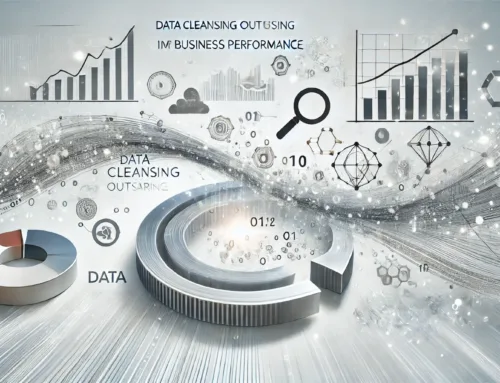Imagine entrusting your data to external experts for cleansing, envisioning a seamless process where errors vanish, and accuracy thrives. But does outsourcing data cleansing guarantee data quality? As you weigh the benefits and potential risks, consider the intricacies involved in this practice. Can the expertise of external professionals guarantee flawless data quality or are there hidden complexities that may impact the outcomes?
Expert Handling
When it comes to outsourcing data cleansing, one of the key benefits is the expert handling that professionals bring to the table. Quality assurance is paramount in data cleansing, ensuring that the information is accurate and reliable. Outsourcing this task to experts who specialize in data cleansing guarantees a meticulous approach to maintaining data accuracy.
Professionals in data cleansing have the necessary expertise to conduct thorough quality checks on the data provided. They understand the importance of accurate data for making informed business decisions. By entrusting them with this task, you can be confident that your data will undergo rigorous scrutiny to ensure its precision.
These experts are well-versed in utilizing various techniques to enhance data accuracy. They have a keen eye for detail and can identify and rectify any discrepancies in the data. Their commitment to quality assurance sets them apart, ensuring that the data cleansing process is carried out meticulously to deliver accurate results. Trusting professionals with data cleansing guarantees that your data will be handled with precision and care.
Use of Advanced Tools
Utilizing advanced tools is a crucial aspect of data cleansing that enhances efficiency and accuracy. These tools play a significant role in improving data accuracy by automating processes like deduplication, normalization, and validation. By leveraging advanced algorithms and machine learning capabilities, data cleansing tools can identify and rectify errors more effectively than manual methods, leading to higher-quality data outputs.
Efficiency improvement is another key benefit of using advanced tools for data cleansing. These tools can handle large volumes of data at a faster pace, enabling quicker processing times and reducing the overall turnaround time for data cleansing projects. Additionally, the automation provided by these tools minimizes the need for manual intervention, allowing data cleansing tasks to be completed with greater speed and consistency.
Regular Data Audits
Employing regular data audits is essential to ensure the ongoing accuracy and reliability of your data. Conducting these audits allows you to identify and rectify any discrepancies or errors in your database promptly. Here are three key reasons why regular data audits are crucial for maintaining data accuracy and consistency:
- Identification of Data Inaccuracies: By regularly auditing your data, you can pinpoint any inaccuracies, such as duplicate entries, missing information, or outdated records. This process helps in maintaining high data accuracy levels.
- Ensuring Data Consistency: Data audits help in ensuring that the information across different systems or departments remains consistent. Consistency is vital to avoid confusion and ensure that decisions are based on reliable data.
- Compliance Monitoring: Regular audits assist in monitoring data compliance with regulatory standards and internal policies. This proactive approach helps in preventing data inconsistencies and inaccuracies, ultimately enhancing overall data quality.
Prevention of Data Decay
To maintain the integrity and reliability of your data, preventing data decay is paramount. Data decay refers to the gradual degradation of data accuracy and integrity over time. It can be caused by various factors such as outdated information, changes in data sources, or lack of regular updates. Preventing data decay requires proactive measures to ensure that your data remains accurate and reliable.
Regular data maintenance and updates are essential in preventing data decay. By consistently monitoring and verifying the accuracy of your data, you can identify and address any inconsistencies or errors promptly. Implementing automated processes for data validation and cleansing can also help in maintaining data integrity.
Furthermore, establishing data quality standards and protocols within your organization can contribute to preventing data decay. By setting guidelines for data entry, storage, and management, you can ensure that data accuracy is maintained throughout its lifecycle. Regular audits and quality checks can help in identifying any issues and correcting them to uphold data integrity.
Removal of Irrelevant Data
To maintain the efficiency and relevance of your data, the meticulous removal of irrelevant data is crucial. Ensuring data accuracy and enrichment hinges on the effective elimination of data that adds no value. Here are three key reasons why the removal of irrelevant data is paramount:
- Enhanced Data Accuracy: By eliminating irrelevant data, you can significantly improve the accuracy of your datasets. Irrelevant information can lead to skewed analytics and flawed decision-making processes. Removing these unnecessary data points ensures that your analyses are based on reliable and pertinent information.
- Improved Data Enrichment: Irrelevant data can dilute the overall quality of your dataset, making it challenging to extract meaningful insights. When irrelevant data is removed, the focus shifts to enriching the remaining data with relevant and valuable information. This process of data enrichment is vital for enhancing the overall quality and usability of your datasets.
- Streamlined Data Management: Removing irrelevant data streamlines your data management processes. It reduces the volume of data that needs to be stored, processed, and analyzed, leading to more efficient operations and better utilization of resources.
Frequently Asked Questions
How Does Outsourcing Data Cleansing Impact Data Privacy and Security?
Outsourcing data cleansing can impact data privacy and security. Ensure the partner implements robust security measures, complies with industry regulations, and prioritizes data accuracy. Regular audits and clear communication can safeguard against potential risks.
Can Outsourcing Data Cleansing Improve Data Accuracy Over Time?
Outsourcing data cleansing can lead to long-term effectiveness by enabling continuous improvement in data accuracy. Through consistent monitoring and optimization, external expertise can contribute to enhancing the quality of data over time.
What Measures Are in Place to Ensure Outsourced Data Cleansing Meets Specific Industry Regulations?
Ensuring industry compliance in outsourced data cleansing involves robust monitoring processes. Quality assurance hinges on meticulous data validation methods. To meet specific regulations, thorough checks and balances are essential for accurate and secure data management.
How Can Outsourcing Data Cleansing Keep up With Evolving Data Trends?
Outsourcing data cleansing allows your business to leverage expertise in data accuracy and keep up with evolving data trends efficiently. By partnering with skilled professionals, you ensure your data is cleansed and optimized to align with current industry standards.
Are There Any Potential Risks or Challenges Associated With Outsourcing Data Cleansing Processes?
When outsourcing data cleansing, quality control and data validation become crucial. Potential risks include data security breaches, misinterpretation of requirements, and communication gaps. These challenges can impact the overall success and accuracy of your data cleansing processes.




